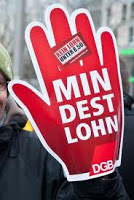Even if many speak about deflation in Europe, we rather think that continuing better data from the United States will help euro zone inflation to bottom out soon, especially because Germany and some other Northern nations will exhibit rising wages and spending. Due to the continuing balance sheet recession and the willingness to reduce debt in Southern Europe and France, inflation will come back very slowly.
As opposed to recently falling oil prices, the main drivers of inflation are wages and unit labor costs. In both the United States and Germany, price increases are driven by services. The most important component of services are shelter&rents, recently up 2.9% in the U.S. This inflation driver is commonly called asset price inflation caused by quantitative easing. In Germany unemployment is at record low, many pay settlements are above 3%: wage earners try to cover the costs caused by asset price inflation.
A high frequency of labor strikes shows that the inflationary cycle for advanced economies has just started in Germany.
Update for Germany, Q3 2014:
Germany: wages +3,6% (Q3), employment +1%. Increase is positive for the euro area
https://t.co/6BbFo4eOG3 pic.twitter.com/u4NwPuulFp
— Markus Brunnermeier (@MarkusEconomist) November 28, 2014
Germany’s train drivers’ union GDL said on Monday it would hold a nationwide strike some time in the coming days, the latest step in its drawn out pay dispute with state-owned rail operator Deutsche Bahn.
The strike will be for an-as-yet undetermined period, but will not go on indefinitely.
GDL is seeking a 5% pay rise for train drivers and a shortening of their working week to 37 hours from 39 hours. The union is also seeking a mandate to negotiate for train guards and other personnel, something Deutsche Bahn has rejected.
Deutsche Bahn had proposed halting the pay dispute until the government had passed a law on standardised wages, which would see the wage deal for the union with the most members in a company apply. GDL has refused to wait.
“Train staff need protection from the excessive strain of overtime due to a lack of personnel and need better employment conditions, if need be through strikes,” GDL said in a statement.
“That’s why in the next days the GDL will call for a temporary, nationwide strike.” (Reuters)
Already in August 2014, for several hours both train and airport staff were on strike at the same time.
From the German statistics destatis.de
Many pay settlements at 3.0% or over in 2014
Trend towards settlements for longer periods
WIESBADEN – The pay round of 2014 has largely been over since mid-year. In many economic branches the parties to collective agreements agreed on pay rises of 3.0% or more for 2014. Many settlements contain pay rises also for 2015, which are generally lower. The Federal Statistical Office (Destatis) further reports that there is a trend towards settlements for longer periods of time.
Cap on Rents 2014
While in the US rents are rising by 2.9% according to latest BEA data, the German government does not want such price increases.
In order to keep city rents broadly affordable, landlords will be barred from raising them by more than ten percent above the local average for new tenants.
The law aims to alleviate exorbitant rental increases in Berlin, Munich, Hamburg and other popular cities which are pricing especially students and young families out of the market.
The ‘rental price brake’ will help keep rents affordable for average wage earners,” said Justice and Consumer Protection Minister Heiko Maas, adding that commonly seen rental hikes of 30 to 40 percent were “unacceptable”.October 2014, source
Germany may become 22nd EU state with federal minimum wage

The new law would come into effect on January 1st, 2015 if it is approved by the upper house of parliament and would force employers across all sectors of Europe’s biggest economy to pay at least 8.50 euros (USD $11) per hour.
See more
German GDP 2013:
Wages have risen by 2.9%, but property and entrepreneur income only by 2.8%. It is not the case in Germany that the rich become richer and the poor poorer. In 2012, entrepreneur even had fallen but wages continued to rise. (source German GDP 2013 release)
Key facts about German inflationary pressures
- The number of employed people has risen by 1.2% in 2012, this growth rate was even bigger in 2011 and 2010.
- In a number of German cities, rising rents caused demonstrations and conflicts. In Stuttgart, rents for existing contracts cannot rise quickly by law (except when they get renovated), rents for newly built flats increased by 13.6 and for renovated ones by 11%. Berlin shows even higher rent hikes.
- For nearly two years, strikes at German airports have been frequent, both security and flight personnel achieved salary hikes.
Only the weakening demand in Asia and other parts of Europe as well as lower gas prices, have helped to reduce the German CPI temporarily to 0.8%. Weaker demand and higher salaries have reduced margins of many German companies. For us this is a sign to be cautious with investments in German exporter stocks, while companies that concentrate on the German market are still a buy.
See more for


















